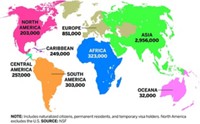Advertisement
Grab your lab coat. Let's get started
Welcome!
Welcome!
Create an account below to get 6 C&EN articles per month, receive newsletters and more - all free.
It seems this is your first time logging in online. Please enter the following information to continue.
As an ACS member you automatically get access to this site. All we need is few more details to create your reading experience.
Not you? Sign in with a different account.
Not you? Sign in with a different account.
ERROR 1
ERROR 1
ERROR 2
ERROR 2
ERROR 2
ERROR 2
ERROR 2
Password and Confirm password must match.
If you have an ACS member number, please enter it here so we can link this account to your membership. (optional)
ERROR 2
ACS values your privacy. By submitting your information, you are gaining access to C&EN and subscribing to our weekly newsletter. We use the information you provide to make your reading experience better, and we will never sell your data to third party members.
Employment
Visa issues likely prevent international science PhD holders from working at US start-ups
by Andrea Widener
August 8, 2019
| A version of this story appeared in
Volume 97, Issue 32
Foreign scientists with PhDs from US institutions are less likely to get a first job at a US start-up company than their US-citizen colleagues, likely because of visa issues, according to a new study (Proc. Natl. Acad. Sci. U.S.A. 2019, DOI: 10.1073/pnas.1820079116). Almost 16% of new PhDs with US citizenship or permanent resident visas work at start-ups, compared with just 7% of PhD holders who would need a work visa. Economist Michael Roach from Cornell University and sociologist John Skrentny of the University of California San Diego followed 2,324 science, technology, engineering, and mathematics (STEM) PhD students during graduate school and their search for a first industry job. All the scientists were equally interested in working at start-up companies. They applied for and received job offers from start-ups in equal numbers, the study shows. But scientists without citizenship or permanent residency were 56% less likely to actually take a job at a start-up. The paper’s authors say visa issues are the likely cause of the disparity. “Given the large and growing number of foreign STEM PhDs graduating from US universities, this is a significant issue for high-growth technology startups and the overall innovation economy,” the authors say.



Join the conversation
Contact the reporter
Submit a Letter to the Editor for publication
Engage with us on Twitter